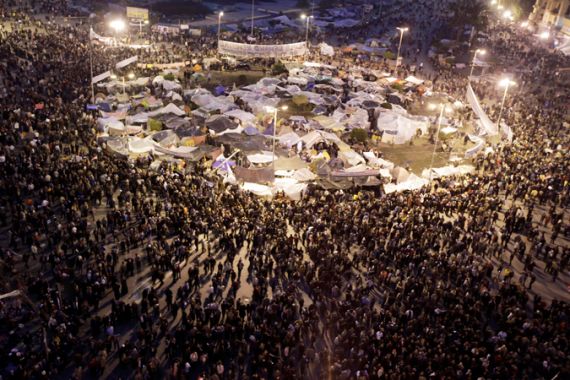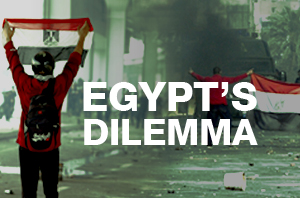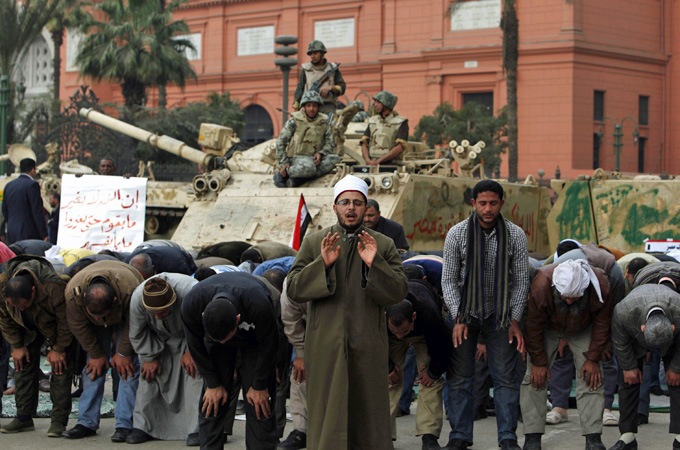Talks fail to end Egypt protests
Pro-democracy protests continue at Tahrir Square, two days after government held talks with opposition to end turmoil.

Pro-democracy protesters are continuing their sit-in in Cairo’s Tahrir (Liberation) Square, showing no signs of being appeased by talks held two days earlier between the government and opposition groups.
Demonstrators seeking the immediate ousting of Hosni Mubarak, the president, were still camped out in the square on Tuesday – as protests enter the fifteenth day in Egypt – while life was slowly getting back to normal in other parts of the Egyptian capital following a fortnight of turmoil.
A day earlier, activists held a symbolic funeral procession in the capital’s Tahrir Square for a journalist killed by a sniper during the unrest. The procession was led by the journalist’s wife and daughter.
About 2,000 pro-democracy protesters also marched in the port city of Alexandria on Monday, Al Jazeera’s correspondent there reported.
The UN says at least 300 people have been killed in the violence since the demonstrations began, with Human Rights Watch, the international rights group, putting the number killed in the cities of Cairo, Alexandria and Suez at 297 on Monday.
An Al Jazeera correspondent said traffic on the streets of Cairo was increasing on Monday, while businesses were beginning to reopen.
 |
|
Click here for more on Al Jazeera’s special coverage |
“There’s a lot of popular public sentiments in Cairo and wider Egypt regarding what those protesters are trying to achieve but at the same time, people are trying to get back to live as normal lives as possible,” he said.
“But some of the shopping malls for example are still closed because they’re afraid of looting, and the banks yesterday were only open for a few hours.”
Another correspondent, also in Cairo, said: “There are divisions. On one side, people do agree with the messages coming out of Tahrir Square, but on the other, Egypt is a country where about 40 per cent of the population lives on daily wages.”
Tanks continue to guard government buildings, embassies and other important institutions in the capital.
The curfew in major Egyptian cities, which has largely been ignored by protesters, has now been shortened to run from 8pm to 6am local time, and the Egyptian stock market is set to reopen for trading on Sunday.
The bourse has been closed since January 27, when it plummeted 17 per cent over two days.
The Egyptian Financial Regulatory Authority, the national financial regulator, will announce new measures affecting trading, according to a statement.
Cabinet meeting
On Monday, the government announced that it was raising all public sector salaries and pensions by 15 per cent, as Mubarak chaired the first full meeting of his cabinet since unrest began on January 25, the state MENA news agency reported.
| IN VIDEO |
|
Our correspondent Ayman Mohyeldin talks about |
Samir Radwan, the country’s new finance minister, told MENA that increasing pensions will cost the government 6.5 billion Egyptian pounds ($940m), while a five billion pound ($840m) fund has also been created to compensate those affected by looting or vandalism during the protests.
While the government is keen on projecting the image of stability returning to the country, however, protesters are unconvinced.
“The word ‘stability’ is a word the regime uses all the time – but … what is stability without freedom?” Dr Sally Moore, a representative of the Popular Campaign in Support of Elbaradei (one of six groups that makes the “Youth of the Egyptian Revolution” coalition), told Al Jazeera.
“We are in for the long haul. The regime is trying to play us against the people in Tahrir Square, but we always remind them they are our people, our families.
“We are talking about freedom … about lost rights for 30 years, … about torture … and I think people want radical change, not only minor reform.”
Meanwhile, an Al Jazeera online producer, reporting from the square, said relations between the protesters and the troops had been turning tense.
On Sunday night, troops stationed near the National Museum briefly opened fire.
Tensions also rose when soldiers attempted to reinforce a barbed wire fence, which the protesters resisted. Agitated protesters staged a sit-in and two of them were detained.
‘People’s revolution’
Omar Suleiman, the country’s newly appointed vice-president, began meetings with six opposition groups on Sunday, including the banned Muslim Brotherhood (MB), in an attempt to end the crisis.
However, Salma El-Tarzi, an activist in Tahrir Square, told Al Jazeera that she was indifferent to the talks.
“The political parties can do whatever they please because they don’t represent us,” she said.
“This is not a revolution made by the parties. The parties have been there for 30 years and they’ve done nothing. This is the people’s revolution.”
Some analysts have called the Muslim Brotherhood’s participation in the dialogue a major concession.
The group had initially refused to participate in any negotiations unless Mubarak resigned.
|
“It’s important for us not to say that our own only two options are either the Muslim Brotherhood or a suppressed people” Barack Obama, |
Essam El-Erian, a member of the MB, Egypt’s largest opposition group, told Al Jazeera that it has to participate “in any dialogue that can meet the demands of the people”.
“This process can encourage more people to be added to protesters in Tahrir Square and all over the country.
“We’ve gone to the dialogue to enforce the revolution … to add more pressure on Mubarak and his regime to leave.”
However, another member of the movement played down the meeting, saying the MB is not prepared to drop its central demand of calling for Mubarak to resign as president.
“We cannot call it talks or negotiations. The Muslim Brotherhood went with a key condition that cannot be abandoned … that he [Mubarak] needs to step down in order to usher in a democratic phase,” Abdul Moneim Aboul Fotouh told Al Jazeera.
Reforms pledged
According to a statement from Suleiman’s office following the meeting, the government offered to form a committee to examine proposed constitutional amendments, pursue allegedly corrupt government officials, “liberalise” media and communications and lift the state of emergency in the country when the security situation was deemed to be appropriate.
But Fotouh said the government had failed to take concrete measures on the ground.
“If they were serious, the parliament would have been dissolved, also a presidential decree ending the emergency law”.
 |
| People gathered to pray in front of tanks to prevent the army from placing barbed wires at the square [Reuters] |
Egypt has been under emergency rule since 1981, the year Mubarak assumed power.
Barack Obama, the US president, made new remarks on the political situation in Egypt after the meeting.
He told the US television network Fox that Egyptians would not permit a repressive government to fill the Mubarak void, adding that the Muslim Brotherhood is only one faction in Egypt.
“But here’s the thing that we have to understand, there are a whole bunch of secular folks in Egypt, there are a whole bunch of educators and civil society in Egypt that want to come to the fore as well.
“So it’s important for us not to say that our own only two options are either the Muslim Brotherhood or a suppressed people.”
In remarks made on the sidelines of a speaking enagement on Monday, Obama said Egypt was “making progress” through the ongoing negotiations.
Also on Monday, PJ Crowley, the US state department’s spokesman, said it would be “challenging” for Egypt to hold free and fair elections immediately. He said the US wants an “orderly transition”, though he stopped short of saying that he thought Mubarak should stay as president in the interim.
Our correspondent in Cairo said the pro-democracy protesters were still not pleased with Obama’s stance on the crisis.
“Protesters tell me Obama still hasn’t come up with any statement that they want to hear,” he said.
“They want immediate change and the feeling among many of them is that the way US is handling this crisis is not good for the way America is perceived both here and in general in the wider region.”